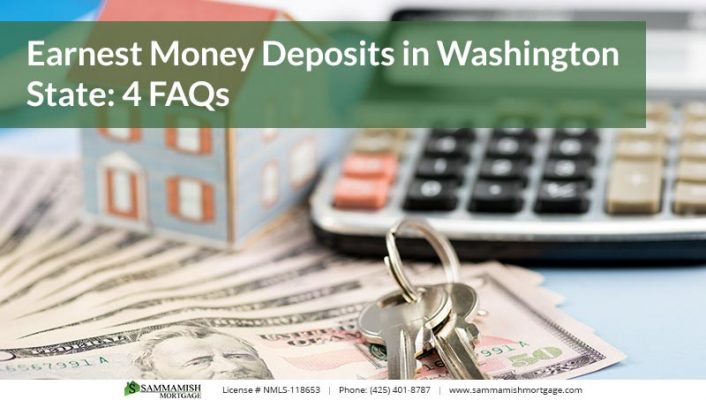No Obligation and transparency 24/7. Instantly compare live rates and costs from our network of lenders across the country. Real-time accurate rates and closing costs for a variety of loan programs custom to your specific situation.

If you’re planning to take out a mortgage and buy a home in Washington State, you’ll need to put forth a deposit. This article will outline some of the more common questions buyers have about earnest money deposits in the state.
First-time home buyers in Washington State tend to have a lot of questions when it comes to earnest money deposits: What is earnest money, exactly? Am I required to pay it? What is the average size of an earnest money deposit in Washington State? Where does my money go? You’ll find answers to these and other questions on the subject below.
Earnest money is the deposit a home buyer puts up front when making an offer to purchase a home. The purpose is to show the seller that you are “earnest” (an old-fashioned word for serious) about buying their house. Once the seller accepts the offer, (by signing it) they can’t change their minds, they are no longer able to accept any other offers.
The seller needs reassurance. The earnest money deposit demonstrates your good faith in purchasing the home and your intent to move the deal forward. Hence, it is also referred to as a “good faith” deposit.
There is no standard requirement amount for earnest money deposits in Washington State. It’s really up to the seller and the buyer. Some sellers request a specific dollar amount, but most just wait and see what the buyer has to offer. It is important to remember, the deposit sends a strong signal to the seller, and it could affect your chances for success.
For example, in a scenario where there are multiple offers from buyers, a stronger earnest money deposit could make your offer more attractive to the seller. This kind of thing is especially important in hot real estate markets like Seattle, where there is stiff competition among buyers
Washington State home buyers generally make an earnest money deposit of 1% to 3% of the sale price. You will want to rely on your local real estate professional’s advice here. They know the “norm” for your area.
Related: Steps in the home buying process
The bottom line. When it comes to the amount of earnest money, adhere to local norms. If you make a smaller-than-average deposit, the seller might thing you’re not serious about buying their home.
Most real estate purchase agreements have what are known as “contingencies” written into them. These are iron-clad deadlines that must be strictly adhered to. From a home buyer’s perspective, a contingency is something that allows you to back out of the contract under certain conditions and expect a full refund of the earnest money deposit. Contingencies can relate to home inspections, mortgage financing, and more.
For example, the contract specifies a time period in which home inspections can be conducted by the buyer. If the inspection reveals major flaws within the structure of the home, and the buyer is no longer comfortable continuing with the deal, the buyer can notify the seller in writing and expect a full refund of the earnest money deposit.
These contingencies protect your earnest money should you need to back out of the contract. If you were to cancel the contract without having a contingency in place, you could end up forfeiting your earnest money to the seller.
If a contract is legally cancelled by the buyer, and the seller refuses to release the funds, Washington State real estate code provides a legal avenue to force the release. In short, if the buyer sends notice to the escrow company to release the funds, the seller has 15 days to respond with a legitimate reason to object to the release. If there is no legitimate reason why the funds should be withheld, the escrow company will release the funds back to the buyer.
Earnest money disputes are rare, but they can occur. As a home buyer, it’s important to understand how these deposits work. Work closely with your Real Estate sales professional to make sure you include the necessary contingencies within your purchase offer to protect your earnest money deposit. Your agent should be very familiar with this process.
Yes! It’s called an earnest money “deposit” because it’s an advance payment toward your home purchase. So, if all goes well and your offer is accepted by the seller, the amount you paid in earnest money will go toward the down payment and closing costs (in most cases) making it part of your real estate investment.
Do you plan to buy a home in Washington State sometime soon? Will you need mortgage financing to complete your purchase? If so, we can help. Sammamish Mortgage has been serving home buyers across the state since 1992. We are a family-owned company based in Seattle & Bellevue, Washington. Our pricing and business model allows us to offer highly competitive rates. We currently lend in all of Washington, Oregon, Idaho, and Colorado. Please contact us if you would like to receive a rate quote for a home loan, and pre-approval.


Whether you’re buying a home or ready to refinance, our professionals can help.
{hours_open} - {hours_closed} Pacific
No Obligation and transparency 24/7. Instantly compare live rates and costs from our network of lenders across the country. Real-time accurate rates and closing costs for a variety of loan programs custom to your specific situation.